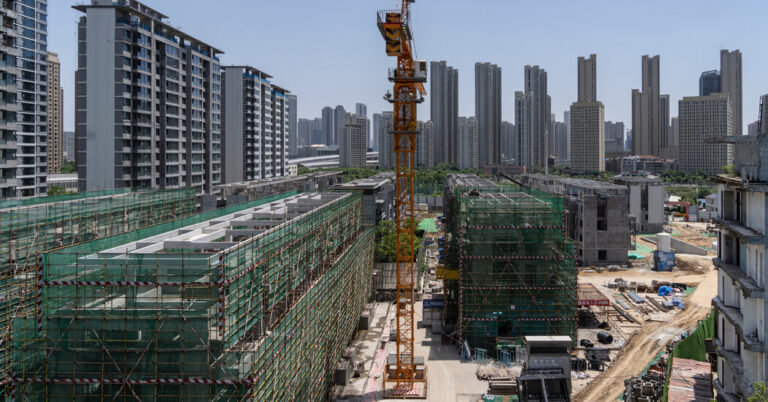The Chinese government is stepping in as the last buyer of the seemingly endless housing crisis.
Chinese authorities took their boldest move yet on Friday, announcing a nationwide plan to buy up some of the country’s vast housing stock that is struggling on the market. Mortgage rules have also been relaxed. The central bank announced it would provide $41.5 billion in low-cost loans to help state-owned enterprises buy homes that have been built but are not selling.
This flurry of action occurred just hours after new economic data revealed the hard truth that no one wants to buy a home right now.
Policymakers have tried a number of measures to attract homebuyers and reverse a steep decline in the real estate market, which shows little sign of recovering anytime soon.
On Friday, authorities from across China participated in a video conference to discuss the challenges they face. China’s Vice Premier He Lifeng has announced a dramatic shift in the government’s approach to dealing with the real estate crisis, which is prompting households to cut spending. Mr. He said local governments may start buying housing to deal with the huge number of vacant apartments.
The homes purchased by the government will be used to provide affordable housing. Mr. He did not provide details about when such a program would start or how it would be funded.
Larry Hu, chief China economist at Australian financial firm Macquarie Group, said the approach is similar to the Troubled Asset Relief Program (TARP), which the U.S. government established in 2008 to buy up distressed assets after the U.S. housing market crash. Said they were similar. .
“This is a policy shift in the sense that local governments are starting to directly enter the real estate market,” Hu said.
Some local governments have already quietly trialled the approach in cities such as Jinan, Tianjin and Qingdao on China’s coast, as well as Chengdu in the south, but this is the first time a senior Chinese official has spoken out about the initiative on the national stage. is.
According to the official account of Chinese state media Xinhua News Agency, Mr. He told officials on Friday that they must fight a “tough fight” to clear all unfinished properties across the country.
Official government data shows that the Chinese government has a long way to go to boost confidence in the real estate market. The amount of unsold homes is at record levels and real estate prices are falling at a record pace.
According to China’s National Bureau of Statistics, as of March, the inventory of unsold homes was equivalent to 748 million square meters (more than 8 billion square feet). In April, new home prices in 70 cities fell 3.5% year-on-year, and existing home prices fell 6.8%, both record declines.
Hours after housing price statistics were released on Friday, the People’s Bank of China took steps to encourage homebuying by lowering down payment requirements. National mortgage rates have also been abolished.
“Policymakers are desperate to increase sales,” said Rosalea Yao, a real estate expert at Gabekal, a China-focused research firm. The central bank has been lowering mortgage rates in recent years, and before the move, average interest rates were already at record lows.
Chinese leaders have set a target for economic growth of around 5% this year, but many independent economists believe the plan is ambitious and will require aggressive government spending. .
To that end, China announced Friday that it had raised $5.5 billion in an initial sale of 30-year bonds as part of a broader plan to raise $140 billion over the next six months.
China’s real estate crisis has been fueled by years of heavy borrowing by property developers and overbuilding that underpinned much of the country’s decades of impressively rapid economic growth.
But when the government finally stepped in to stop dangerous practices by developers in 2020, many companies were already on the brink of bankruptcy. China Evergrande, one of the largest real estate developers, defaulted on its debts at the end of 2021 with huge debts. It left behind hundreds of thousands of unfinished apartments and hundreds of billions of dollars worth of unpaid bills.
The real estate crisis has left many Chinese families who once poured their lifetime savings into real estate with no viable alternative to building wealth. China’s stock market has recovered in recent months but remains volatile, leaving few better options.
Evergrande was the first in a series of high-profile defaults that are currently disrupting the industry. A Hong Kong court ordered the company into liquidation in January. Country Garden, another struggling real estate giant, held its first hearing in a Hong Kong court on Friday in a lawsuit brought by investors seeking to liquidate the company.
prince Contributed to research from Hong Kong.

